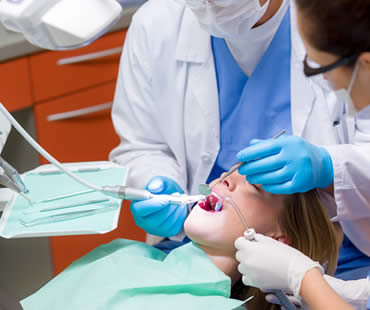
Sedation dentistry, also known as “sleep dentistry,” refers to the practice of calming and relaxing a patient prior to a dental procedure with the use of pharmacological agents. Sedation dentistry began in the late 1700s when a chemist named Humphry Davy began experimenting with inhaled gasses and first observed the analgesic effects of nitrous oxide, commonly known as “laughing gas,” on himself and on dental patients.
In 1844, an American dentist named Horace Wells used nitrous oxide as a dental anesthetic during the extraction of his own molar tooth. Wells made the observation that while he experienced very little pain while undergoing the extraction, he was still fully conscious during the procedure. A few years later, dentist William Morton and surgeon John Warren performed a public oral surgery at Harvard University, demonstrating the analgesic properties of a sulfur-ether compound, further proving that sedation dentistry should be explored further.
For years, trial and error procedures informed doctors of the safety of various levels of pain-relieving gasses. It was discovered that 100% nitrous oxide, when used in prolonged dental cases, could lead to hypoxia, a condition in which the body is deprived of the oxygen it needs to thrive, something that can eventually lead to death. Finally, a Chicago surgeon named Dr. Edmund Andrews began mixing nitrous oxide with oxygen, administering them simultaneously. This allowed for safer analgesic options for both surgical and dental procedures. Ether and chloroform, combined with some nitrous oxide, was later shown to provide deeper sedation for prolonged treatments.
Intravenous (IV) sedation began in the 1960s at the Loma Linda University School of Dentistry in California. Dentists there experimented with IV sedation for the highest level of management for pain, anxiety and fear for dental patients undergoing surgery.
Today, dentists routinely turn to sedation dentistry for their patients to relieve pain, stress and to provide the most comfortable dental therapies as possible. Talk to your dentist to discover the latest sedation dentistry options and to see how they can help you positively experience your next dental procedure.
If you live in the Fernandina Beach area contact us today

Obesity, defined as an excess proportion of body fat, has reached epidemic levels in the United States. This condition presents health risks to many areas of your body, and takes a toll on just about every aspect of your life. What does obesity have to do with oral health? Recent studies have linked the development of obesity with oral bacteria.
By testing the saliva of overweight people compared to individuals within a healthy weight range, researchers have discovered an oral bacteria present in 98 percent of the obese subjects. Experts believe this bacteria is an indicator of developing an overweight condition. Also, they suspect that the bacteria may participate in the body functions that lead to obesity.
Preventing and controlling obesity usually begins with analyzing and changing your diet. A high glycemic diet, which generally means a diet high in sugars, contributes to weight gain. It is also connected with your dental health, because sugars in your mouth are converted into plaque. If plaque accumulates on your teeth and gums, the risk increases for tooth decay and gum disease.
While it will likely benefit your waistline to reduce the amount of sugar consumed, doing so will reduce your risks for oral disease. Likewise, regular dental checkups, proper oral hygiene including brushing and flossing twice daily, and smart diet modifications will also lower your oral health risks. As experts continue to investigate the connection between your mouth and your overall health, following recommendations for caring for your mouth will likely decrease oral bacteria and possibly limit your risks of other health concerns such as obesity.
We look forward to seeing you in our Fernandina Beach dental office

Due to the increased interest in cosmetic dentistry, many family dentists are becoming trained to offer more extensive procedures and treatments geared to improve the appearance of your smile. Many of these treatments are quick and painless, and can offer almost instant results. Some of the cosmetic dentistry options offered by your family dentist may include:
- Professional teeth whitening to improve the color and brightness of dark, dingy, or discolored teeth
- Placement of dental veneers to improve the look of gapped, stained, or crooked teeth
- Replacement of old or unattractive metal fillings with more natural, tooth-colored materials
- Placement of crowns and bridges to repair and replace missing or severely damaged teeth
- Correction of small spaces or gaps between teeth by bonding with tooth-colored composite resin
- Insertion of dental implants to replace missing teeth
- Straightening of teeth and correction of bite problems with braces or Invisalign
Because your family dentist is already aware of your family’s dental history, it will be simple to recommend treatment plans. With this knowledge, your dentist can also quickly and expertly assess if you or other members of your family are suitable candidates for the procedures you are seeking. Your family dentist can perform all the same services as both a pediatric dentist and a general dentist, and will be able to address the cosmetic dental concerns of every member of your family. Family dentists can provide advice as to which procedures are age appropriate and give guidelines for when treatment is recommended.
If anyone in your family is not pleased with the appearance of their teeth, consult first with your family dentist to find out what cosmetic dental procedures and treatments are offered to improve the quality of their smile.
Our dental office is located in Fernandina Beach

Most people who bite their nails wish they didn’t do it. If you’re a nail biter, you probably know that it spreads germs and leaves your nails looking unattractive. But did you know that it can harm your teeth? Let’s find out the connection between nail biting and tooth damage, and learn some ways to stop this nasty habit.
What does nail biting do to my teeth?
Just like chewing on hard items like ice, nails are hard and put stress on your teeth when you bite down on them. With time, your teeth will weaken and your teeth can chip or break. Since nail biting is a repetitive habit, constant chewing on your teeth wears them down faster than they should. Your teeth also can become more sensitive when the enamel is worn down. Additionally, biting your nails can move your teeth out of place. Your gums are at risk too from the additional stress the nail biting puts on them, eventually leading to gum disease and even tooth loss.
What if I wear braces?
Braces already add pressure on your teeth, so nail biting can stress them even more. The roots of your teeth can be weakened, which leads to problems like tooth loss.
How can I stop biting my nails?
Here are some tips to help you stop the nail biting habit:
- Get a hobby that uses your hands, like video games, knitting, or painting.
- Occupy your mouth by chewing sugarless gum, sucking on mints, or eating carrot sticks.
- Add foods to your diet containing calcium and magnesium because they help repair and grow your nails.
- Cover your nails with tape, petroleum jelly, fake nails (for girls), or foul-tasting liquid.
- Get manicures to make your nails look nice, so you will be less inclined to bite them.
If you need a dentist in Fernandina Beach contact us today

Having tooth pain or problems can be one of the most uncomfortable experiences possible. It is hard to ignore because it makes your whole quality of life worse. When infection or decay reaches the inner parts of your tooth, it can cause many miserable symptoms. Often the key is getting root canal treatment to save your tooth and alleviate your symptoms. Here are some warning signs that indicate you might need this type of treatment.
Severe pain:
Although not always present, severe pain sometimes occurs with a tooth that needs root canal therapy. It may be sharp, intense pain or a dull ache that won’t subside. If you experience tooth pain that is severe or lasts for several days, see your dentist for an evaluation. If root canal treatment is necessary, any pain you may have will likely disappear after a successful procedure.
Sensitivity to hot or cold:
Discomfort when consuming hot or cold items is another sign of a problem. Mild sensitivity is usually not a big deal, but actual pain when your tooth hits these temperatures may mean the tooth is in an advanced stage of trouble.
Gum tenderness or inflammation:
Swelling or tenderness is often associated with infection, although it doesn’t always mean infection is present. Your dentist can determine the seriousness of the issues and whether root canal treatment is advised. Watch for tenderness, swelling, or even a lump in the affected area.
Darkened tooth:
Discoloration is a sign that the nerves of a tooth are damaged. The tooth may become gray, black or dark yellow. Tooth discoloration is also related to trauma, damaged fillings or severe decay, so visiting your dentist for a checkup is recommended.
Gum boils:
If lesions similar to a pimple form in the gum tissues, it is called a gum boil. It is usually an accumulation of pus, which can be linked to infection. The boil may be larger or smaller at certain times, depending on the activity of the infection in your mouth. It will feel tender and can cause swelling in the area, and you may notice a bad taste in your mouth.
If you have symptoms such as these, see your dentist to learn if root canal treatment is the solution.
Our dental office is located in Fernandina Beach

A variety of factors can cause your teeth to become dark and dingy. Smoking or chewing tobacco, drinking wine, coffee or tea, eating pigment intense foods, too much fluoride, or trauma to the tooth can all cause your teeth to discolor and lose their shine. The good news is cosmetic dentistry offers several options to return your teeth to their natural whiteness:
- Professional teeth whitening can be completed in as little as one office visit and can lighten your teeth as much as ten shades. This type of whitening mainly treats surface stains and can last several years with careful maintenance.
- Dental veneers are a better option for teeth with internal stains that are resistant to professional whitening. The placement of veneers involves roughing up the surface of the tooth and then applying an extremely thin porcelain or composite veneer that bonds to the surface of the tooth. With care, dental veneers can last as long as ten years.
- For individual teeth that have changed color due to damage or trauma, composite bonding is an excellent option. This procedure involves the use of a tooth-colored bonding material to cover the surface of the tooth and match it to the color of the surrounding teeth.
If you suffer from a dark or discolored smile and want to restore it to bright and white, cosmetic dentistry may be the answer to your concerns. Schedule a consultation with a qualified cosmetic dentist to find out which treatments would best suit your needs and allow you to once again face the world with a beautiful, white smile.
We look forward to seeing you in our Fernandina Beach dental office







